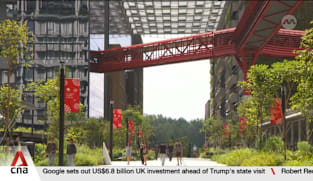Louis Chua on Lease Agreements for Retail Premises Bill
The Bill is a step in the right direction in addressing certain pain points and unfair leasing terms and conditions that used to be prevalent in the retail landscape, said MP Louis Chua. Speaking in Parliament on Thursday (Aug 3), he said there is room for improvement. One way is to enhance data transparency and information sharing and narrow the gulf in information between small- and medium-sized enterprise (SME) tenants and retail landlords. He hopes that more can be done to effectively bridge the power differential between landlords and tenants and provide smaller retailers with a better fighting chance to sustain their businesses. Mr Chua pointed out that one way that landlords could wield a disproportionate amount of power at the negotiating table is by exploiting the information disparity between them and the tenants. This enables them to command higher rents during lease negotiations, he said. He noted that the current Code and legislation do not include data transparency guidelines as a requirement for all qualifying leases. He wanted to know if the Government would consider providing more fine-grained data to be presented and at a higher frequency. He urged the Government to truly enable fair and equal access to information for landlords and tenants by launching a public rental information database, similar to the one mooted by the Fair Tenancy Framework Industry Committee back in 2020, namely a public rental information database uploaded monthly, and mall-level productivity and performance data made available by landlords to tenants. Mr Chua said this would benefit tenants, especially SME tenants who may not be able to compare rents and key retail metrics across locations. Smaller landlords would also benefit from the ability to better position their mall in a market dominated by key players, he added. He wanted to know if the Government is actively considering such a database and whether the Housing and Development Board, as one of the largest landlords of retail space, is willing to lead by example and provide such information. Besides enhancing data and information transparency, efforts should also be put into ensuring that tenants are better informed when negotiating their leases and signing the lease agreement, said Mr Chua. He hopes the Government could provide more information, such as the amount of resources dedicated to outreach and education efforts, especially for SME retailers. He also said it is worth considering whether such a Code of Conduct can be extended to non-retail leases. Given that significant effort had already been put in by various parties to refine the retail Code of Conduct, it would be worthwhile to look into extending this to other commercial and industrial sectors, he said.
The Bill is a step in the right direction in addressing certain pain points and unfair leasing terms and conditions that used to be prevalent in the retail landscape, said MP Louis Chua. Speaking in Parliament on Thursday (Aug 3), he said there is room for improvement. One way is to enhance data transparency and information sharing and narrow the gulf in information between small- and medium-sized enterprise (SME) tenants and retail landlords. He hopes that more can be done to effectively bridge the power differential between landlords and tenants and provide smaller retailers with a better fighting chance to sustain their businesses. Mr Chua pointed out that one way that landlords could wield a disproportionate amount of power at the negotiating table is by exploiting the information disparity between them and the tenants. This enables them to command higher rents during lease negotiations, he said. He noted that the current Code and legislation do not include data transparency guidelines as a requirement for all qualifying leases. He wanted to know if the Government would consider providing more fine-grained data to be presented and at a higher frequency. He urged the Government to truly enable fair and equal access to information for landlords and tenants by launching a public rental information database, similar to the one mooted by the Fair Tenancy Framework Industry Committee back in 2020, namely a public rental information database uploaded monthly, and mall-level productivity and performance data made available by landlords to tenants. Mr Chua said this would benefit tenants, especially SME tenants who may not be able to compare rents and key retail metrics across locations. Smaller landlords would also benefit from the ability to better position their mall in a market dominated by key players, he added. He wanted to know if the Government is actively considering such a database and whether the Housing and Development Board, as one of the largest landlords of retail space, is willing to lead by example and provide such information. Besides enhancing data and information transparency, efforts should also be put into ensuring that tenants are better informed when negotiating their leases and signing the lease agreement, said Mr Chua. He hopes the Government could provide more information, such as the amount of resources dedicated to outreach and education efforts, especially for SME retailers. He also said it is worth considering whether such a Code of Conduct can be extended to non-retail leases. Given that significant effort had already been put in by various parties to refine the retail Code of Conduct, it would be worthwhile to look into extending this to other commercial and industrial sectors, he said.



















